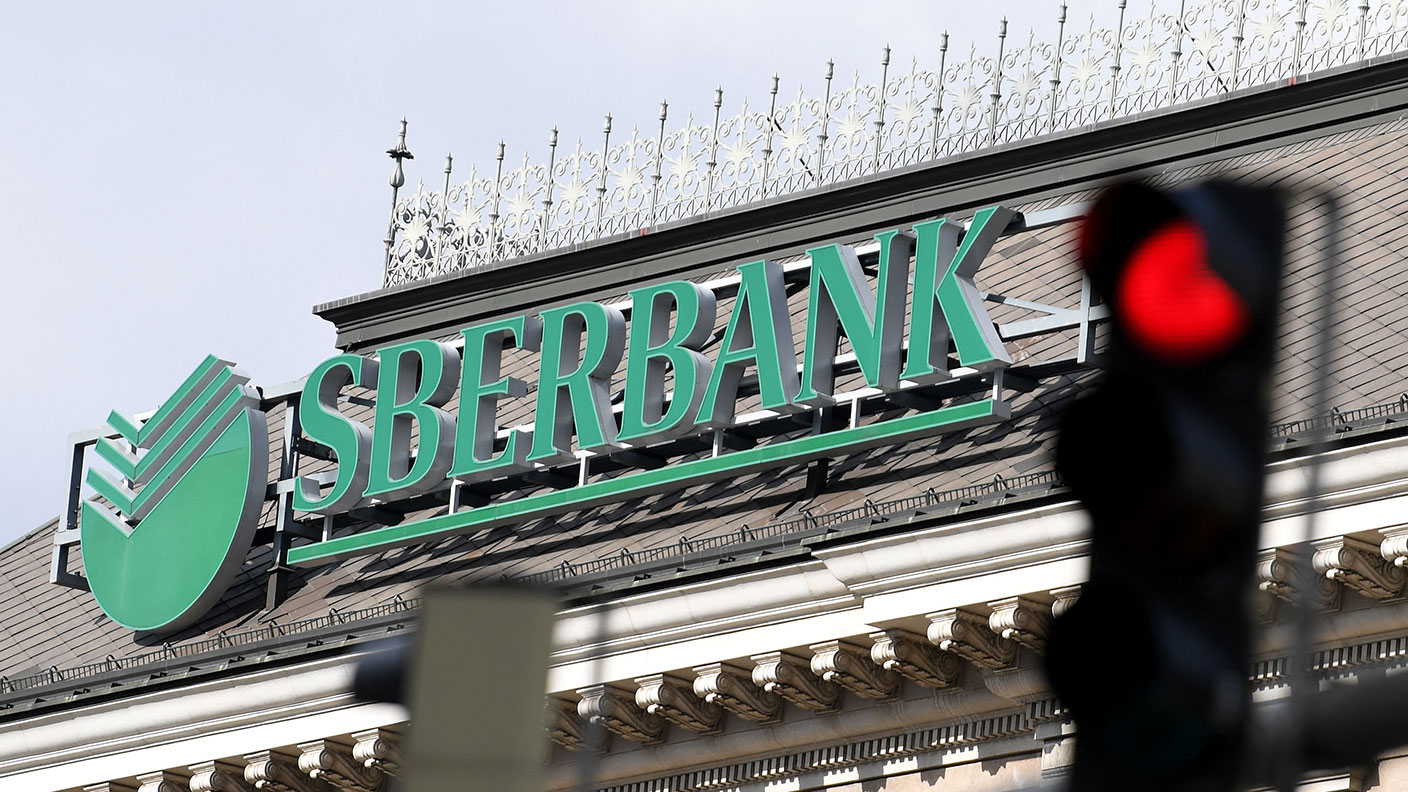What exclusion from the SWIFT banking system means for Russia
As part of Western sanctions, many of Russia's banks have been banned from the SWIFT system. Saloni Sardana explains what that is, and how the ban will affect Russia


Get the latest financial news, insights and expert analysis from our award-winning MoneyWeek team, to help you understand what really matters when it comes to your finances.
You are now subscribed
Your newsletter sign-up was successful
Want to add more newsletters?

Twice daily
MoneyWeek
Get the latest financial news, insights and expert analysis from our award-winning MoneyWeek team, to help you understand what really matters when it comes to your finances.

Four times a week
Look After My Bills
Sign up to our free money-saving newsletter, filled with the latest news and expert advice to help you find the best tips and deals for managing your bills. Start saving today!
If Russian president Vladimir Putin had any doubt that the West was serious about imposing strict sanctions against its invasion of Ukraine, he met with a nasty surprise this weekend.
The UK, US, EU and Canada banned some Russian banks’ access to SWIFT this weekend, a move which caused the Russian rouble to plunge by almost 30% against the US dollar on Monday and prompted Russia’s central bank to more than double its interest rate to 20%.
A statement from the EU, US and UK said the ban will "ensure that these banks are disconnected from the international financial system and harm their ability to operate globally".
MoneyWeek
Subscribe to MoneyWeek today and get your first six magazine issues absolutely FREE

Sign up to Money Morning
Don't miss the latest investment and personal finances news, market analysis, plus money-saving tips with our free twice-daily newsletter
Don't miss the latest investment and personal finances news, market analysis, plus money-saving tips with our free twice-daily newsletter
According to Ursula von der Leyen, president of the European Commision, the SWIFT ban will effectively bar Russia’s exports and imports.
What is SWIFT?
SWIFT was founded in 1973 and stands for Society for Worldwide Interbank Financial Telecommunication. It is a network used by financial institutions to send secure messages relating to transactions and the transfer of money.
It connects banks when a transaction is made; if the two organisations making the transaction are not already partners, then SWIFT can connect them through an intermediary.
More than 11,000 financial institutions around the world use the system to send more than five billion messages a year, making it an integral part of the global system of financial transfers.
It is overseen by the central banks of the G10 countries (actually 11: Belgium, France, Canada, Germany, Italy, Japan, the UK, the US, Switzerland, Sweden and the Netherlands) with the National Bank of Belgium acting as the lead overseer.
It is owned by its shareholders (financial institutions) and represents roughly 3,500 firms across the globe.
How badly will the SWIFT ban affect Russia?
It remains unclear how badly the move will affect Russia as it is not yet known which banks will be excluded from SWIFT. But around 70% of the country’s banking market will be affected, says Reuters.
If Russia’s largest banks, including the likes of Sberbank and Gazprombank, are targeted, then it could be a huge blow to the economy.
SWIFT is significant to Russia because, of the 40 million messages sent a day via SWIFT, 1% are estimated to involve Russian payments, says the BBC.
Zoltan Pozsar, a strategist at Credit Suisse, believes “exclusions from SWIFT will lead to missed payments and giant overdrafts similar to the missed payments and giant overdrafts that we saw in March 2020.”
“Banks’ inability to make payments due to their exclusion from SWIFT is the same as Lehman’s inability to make payments due to its clearing bank’s unwillingness to send payments on its behalf. History doesn't repeat itself, but it rhymes,” he added.
The collapse of Lehman Brothers is widely seen as the start of the Great Financial Crisis of 2008.
According to estimates by Alexei Kudrin, Russia’s former finance minister, Russia’s exclusion from SWIFT could cut Russia’s GDP by 5%.
This is not the first time Russia has faced the threat of expulsion from SWIFT. Russia was threatened with a similar move in 2014 when it annexed Crimea. That expulsion did not happen, and Russia set up an alternative, albeit smaller system, called System for Transfer of Financial Messages (STFM).
While it is hard to see STFM as a serious contender to SWIFT today, it could still help Russia cushion some of the economic shock. And there is also the possibility that Russian banks “might route payments via countries that have not imposed sanctions, such as China, which has its own payments system,” says the BBC.
What other sanctions have been imposed?
Apart from banning Russia from SWIFT, Russia’s central bank has also been blocked from using its $630bn in foreign reserves, making it harder for the country to shore up its economy against the wave of sanctions, reports the Financial Times.
“With assets of CBR [the Central Bank of the Russian Federation] set to be frozen around the world, it will severely limit Moscow’s ability to access its foreign currency reserves, part of the war chest it had built up, to try and insulate the country from the worst of the economic punishments,” says Susannah Streeter, investment and markets analyst at Hargreaves Lansdown.
The EU also froze foreign assets held by both Putin and Russia’s foreign minister, Sergey Lavrov.
Switzerland, a nation known for its neutrality, broke from tradition and said it will also sanction Russia. "In view of Russia’s continuing military intervention in Ukraine, the Federal Council took the decision on February 28 to adopt the packages of sanctions imposed by the EU on February 23 and 25“, the country’s government said in a statement on Monday.
Russian-registered planes and airlines have also been banned from most of Europe’s airspace.
How has the rouble reacted?
As my colleague John pointed out, it would be an understatement to say that the Russian rouble was in freefall. As recently as a fortnight ago, one pound would fetch you just shy of 104 rubles, but as of this morning it’ll get you 140, a jump of more than 30%.
Russians were scrambling to withdraw foreign cash such as dollars from cash machines on Monday according to multiple reports.
How does the SWIFT ban affect Russia’s energy sector?
The move also has ramifications for the energy sector, through higher inflation, given Russia is the world’s second largest exporter of both oil and natural gas and supplies Europe with 40% of natural gas.
There may also be further turmoil caused by missed payments for Russia’s agricultural and energy sectors.
According to Rick Joswick, head of global oil analytics at S&P Global Platts, the SWIFT ban will make Russian oil less attractive: "It will likely make many buyers more hesitant to purchase Russian oil. That will tend to drive down the price of Russian crude oil even more until it ultimately clears outside of its traditional markets in Europe".
However, the oil price is likely to continue to rise as sanctions threaten further disruptions to supply. On Monday, Brent crude oil was trading above $100 a barrel, a level which was passed last week for the first time since 2014.
Get the latest financial news, insights and expert analysis from our award-winning MoneyWeek team, to help you understand what really matters when it comes to your finances.
Saloni is a web writer for MoneyWeek focusing on personal finance and global financial markets. Her work has appeared in FTAdviser (part of the Financial Times), Business Insider and City A.M, among other publications. She holds a masters in international journalism from City, University of London.
Follow her on Twitter at @sardana_saloni
-
 Should you buy an active ETF?
Should you buy an active ETF?ETFs are often mischaracterised as passive products, but they can be a convenient way to add active management to your portfolio
-
 Power up your pension before 5 April – easy ways to save before the tax year end
Power up your pension before 5 April – easy ways to save before the tax year endWith the end of the tax year looming, pension savers currently have a window to review and maximise what’s going into their retirement funds – we look at how
-
 No peace dividend in Trump's Ukraine plan
No peace dividend in Trump's Ukraine planOpinion An end to fighting in Ukraine will hurt defence shares in the short term, but the boom is likely to continue given US isolationism, says Matthew Lynn
-
 Investors need to get ready for an age of uncertainty and upheaval
Investors need to get ready for an age of uncertainty and upheavalTectonic geopolitical and economic shifts are underway. Investors need to consider a range of tools when positioning portfolios to accommodate these changes
-
 Europe’s new single stock market is no panacea
Europe’s new single stock market is no panaceaOpinion It is hard to see how a single European stock exchange will fix anything. Friedrich Merz is trying his hand at a failed strategy, says Matthew Lynn
-
 Ukraine invades Russia – what are the political implications?
Ukraine invades Russia – what are the political implications?Ukraine's surprise invasion into Kursk could change the course of the war politically
-
 UK wages grow at a record pace
UK wages grow at a record paceThe latest UK wages data will add pressure on the BoE to push interest rates even higher.
-
 Trapped in a time of zombie government
Trapped in a time of zombie governmentIt’s not just companies that are eking out an existence, says Max King. The state is in the twilight zone too.
-
 America is in deep denial over debt
America is in deep denial over debtThe downgrade in America’s credit rating was much criticised by the US government, says Alex Rankine. But was it a long time coming?
-
 UK economy avoids stagnation with surprise growth
UK economy avoids stagnation with surprise growthGross domestic product increased by 0.2% in the second quarter and by 0.5% in June
